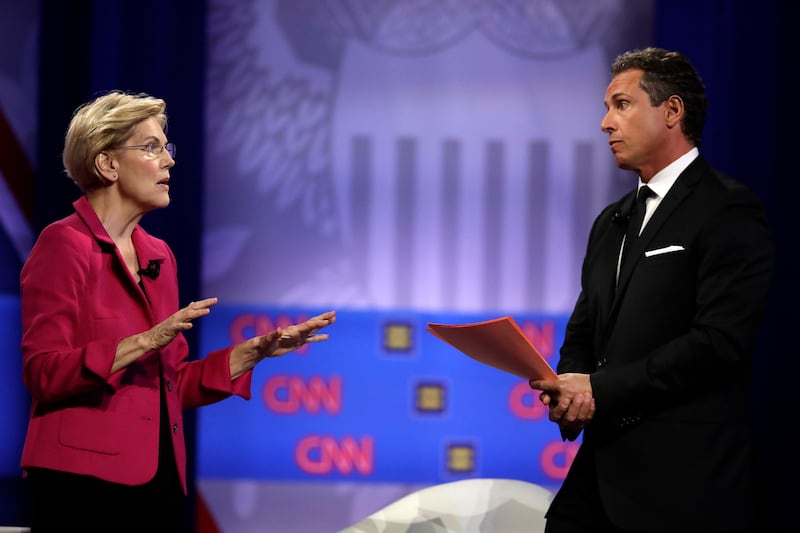SALT LAKE CITY — Earlier this month, top Democratic presidential candidates took part in a CNN town hall on LGBTQ rights. They discussed sexual orientation-based discrimination, health care access, what to do when LGBTQ rights clash with religious freedom protections and a number of other important topics.
Kelsey Dallas, who covers the intersection of religion and society for the Deseret News, watched the event and reported on what was said and why it mattered. She highlighted controversial moments like when Beto O’Rourke called for conservative churches to lose their tax-exempt status or Sen. Elizabeth Warren joked about a man who opposes same-sex marriage struggling to find a date.
Her article, titled “During LGBTQ rights town hall, top Democrats call for limits on religious freedom,” was posted soon after the discussion wrapped up. She emphasized why Democrats’ gay rights plans were upsetting for some religious freedom advocates, including many who support passing new protections for gay and transgender Americans.
Kelsey quoted the candidates and wrote: “Instead of highlighting opportunities for compromise, participants expressed frustration with conservative people of faith and called for limits on religious freedom protections.”
That was true, and Kelsey’s article was praised as a “must read” for readers and included as a link in newsletters. But some readers were unhappy. The day after her story was posted, she heard from several people who argued that Democratic presidential candidates were trying to uphold the true meaning of religious freedom and end discrimination against LGBTQ individuals.
That was interesting criticism. What is the true meaning of religious freedom? Who gets to decide what that means? If a religious person feels discriminated against, is that as valid as a member of the LGBTQ community feeling discrimination? And how does the country end discrimination of LGBTQ individuals?
This week, Kelsey went to Dallas, Texas, to talk about covering faith and religion — and used the reaction to that story as a way of advancing the effort to bring understanding to the country. She met with religious leaders, educators, attorneys and others who also want to help people understand current debates over religious freedom without escalating tensions. The event was hosted by the Dallas-Fort Worth Alliance for Religious Freedom and Southern Methodist University.
Speakers, who came from a wide range of political and professional backgrounds, discussed why religious freedom matters, describing legal battles over the location of new houses of worship and legislative debates about whether churches could open their doors to asylum seekers. They celebrated America’s efforts to protect religious pluralism, while also worrying about widespread confusion about what religious freedom laws actually mean.
Rather than criticize those who equate religious freedom with discrimination, participants focused on their own shortcomings. Kelsey, who participated on several panel discussions, noted the words of the Rev. Bob Roberts, a prominent evangelical Christian pastor, who said too often faith leaders who claim to celebrate religious diversity spend their time tearing down other people’s beliefs.
A keynote address by Brett Scharffs, the director of the International Center for Law and Religion Studies at Brigham Young University, focused on “Human dignity as an underpinning of religious freedom.” That’s human dignity for all.
Shannon Minter, the legal director of the National Center for Lesbian Rights, one of the nation’s leading legal advocacy organizations for LGBT people, spoke about the value of legislative efforts to balance protections for the LGBT community and people of faith. He said that in an ideal world, resolutions to contentious debates are found outside of the courtroom.
Kelsey had the opportunity to speak about the reaction to her story on the LGBTQ rights town hall and what she’s learned from covering heated religious freedom debates over the past few years. She explored her efforts to include a wide range of opinions in her stories and engage with people who have objected to her coverage in the past.
More importantly, she collected tips from people who are also trying to do better, and she’s going to bring those lessons back with her to our newsroom.
When I spoke with Kelsey Thursday night after the conference, I asked her about what stood out to her most from the presentations. She said the greatest benefit was being inspired by the group of community leaders in Texas who cared enough about religious freedom to arrange an entire event focused on what they can do better.
That kind of humility is rare these days, including in many newsrooms. But it can be the starting point for new approaches that change the world, or, at the very least, change the tone of today’s religious freedom debates.
We are glad that Kelsey and the Deseret News have a part in that effort.


